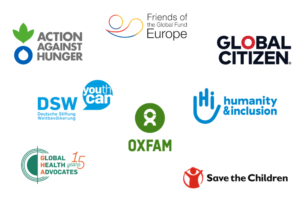Making it happen: 18 measures for the Belgian
Presidency to deliver on global health
January 2024
Belgium has chosen to make global health one of the priorities in the area of development during its presidency of the Council of the European Union. We welcome this strong commitment and invite Belgium to demonstrate its Presidency leadership by taking an ambitious and collective stance on advancing global health equity, leveraging and mobilising funding commitments, and addressing the root causes of health inequalities globally. To ensure that the Belgian Presidency is successful in delivering concrete and ambitious global health goals, we call on the Presidency to:
Champion the EU’s leadership in global health
- Adopt ambitious Council Conclusions endorsing the EU Global Health Strategy with clear objectives and financial commitments, fully supporting its implementation through a strong rights-based approach to health, acknowledging the important role of gender equality in the promotion of global health, and continuing the strong support to global health initiatives like Gavi, the Vaccine Alliance and the Global Fund to Fight AIDS, Tuberculosis and Malaria ahead of their next replenishments;
- Adopt an effective monitoring and evaluation framework to track and assess the implementation of the EU Global Health Strategy;
- In the context of the revision of the EU Pharmaceutical legislation which currently lacks any global health considerations, reaffirm the EU’s commitments to transparency, equity and policy coherence by ensuring the inclusion of a strong global health dimension;
- Champion global health during the MFF revision negotiations, by preventing cuts to be made from essential funding dedicated to health issues and ensuring that the EU’s objectives on Global Health are met by an ambitious budget.
Go back to basics: strengthen health systems, progress towards Universal Health Coverage and improve health in all policies
- Ensure that health equity remains at the core of the EU decision-making and programming, with concrete efforts to address social-determinants of health and translate “leave no one behind” in a reality across the continuum of care (promotion, prevention, treatment, rehabilitation and palliative care);
- Ensure that development funds do not lead to the financialisation and commercialisation of health care in low- and middle-income countries, but are aimed at expanding equitable, publicly funded and delivered health care free at the point of need;
- Lead EU Member States towards an ambitious WHO Pandemic Agreement which takes into account lessons learnt from the COVID-19 pandemic and goes beyond existing structures and policies perpetuating global inequalities to effectively and equitably address future health emergencies;
- Foster stronger political commitment in fighting climate-sensitive diseases and building climate-resilient health systems by building on the EU Member States’ signatures of the COP declaration on health and climate;
- Reaffirm the principle that, when EU public funding is used to develop biomedical countermeasures, it must be accompanied by access conditions to guarantee the availability, affordability, and accessibility of medical products to all those in need, including to low and middle income countries.
Reaffirm health as a key element of the EU-AU partnership
- Identify and publicly share targets and financial commitments made to support the EU-Africa partnership on health;
- Assess the progress of the EU-AU partnership on health and present how the EU will continue supporting its implementation;
- Adopt a health-specific declaration in the frame of the EU-AU partnership, acknowledging the parties’ commitments to upholding Africa’s health sovereignty, recognising the key role of research and innovation (R&I) in advancing health, supporting a strong rights-based approach to health, recognising the importance of the promotion of sexual and reproductive health and rights (SRHR) and gender equality, investing on the first 1000 days of life of children and fight against child mortality, integrating the key role of nutrition as well as enhancing Primary Health Care (PHC) to achieve Universal Health Coverage (UHC) by 2030;
- Support the implementation of the public health ambitions set out in the EU-AU Innovation Agenda;
- Support the strengthening of African countries’ medical R&D and production capacity, while ensuring that this is not limited to expanding the commercial market for private companies, but builds on public initiatives such as WHO’s mRNA technology transfer program;
- Ensure the Africa Initiative of Horizon Europe delivers on the EU and AU’s shared commitment to advancing health.
Improve the Team Europe approach as an important tool to advancing health
- Improve transparency around the regional health Team Europe Initiatives (TEIs), making sure relevant information is publicly available, in particular on the participating members and partners, the initiatives’ timeframe, budget, governance, and monitoring and evaluation framework;
- Improve the meaningful participation of CSOs, local partners, including youth- and women-led organisations, organisations of underrepresented groups including persons with disabilities, community-based organisations in the design and implementation of the health regional TEIs;
- Ensure coordination between regional health TEIs, as well as with other EU and member states funded programmes, to capitalise on their synergies.

